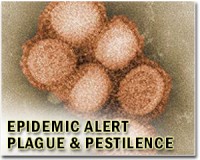| . |  |
. |
Ottawa (AFP) Oct 20, 2009 Canadian health officials on Tuesday announced the first case of turkeys catching the swine flu in this country, likely from humans, and urged farm workers to get vaccinated soon. But authorities also scrambled to encourage Canadians not to panic. The outbreak on a farm in Ontario province is the second case in the world, after Chile reported a case in August. Officials said the flock in Ontario province had been quarantined and none of the birds or their eggs had entered the food chain. But they warned of a minimal risk to human health as the virus mutates going from humans to animals. "This essentially human virus has been identified previously in swine and in poultry. Our working hypothesis is that this situation likely involved human-to-bird transmission," said Ontario chief veterinarian Deb Stark. "Although rare, this finding is not unexpected," she told a press conference. "The risk to human health from this situation is minimal," said Arlene King, Ontario's chief medical health officer. "But it is the clarion call to people who work with livestock to get both the seasonal and the H1N1 flu shot." "The risk is the potential changes to the virus against which people could have reduced or no immunity," King said. Breeders Hybrid Turkeys in Kitchener, Ontario, said in a statement that "the Canadian Food Inspection Agency (CFIA) has confirmed that the cause of an egg production drop in a flock, in a single barn of Hybrid Grand Parent Breeding turkeys in Ontario, was due to the novel H1N1 influenza virus. Recently novel H1N1 was reported as the cause of an egg production drop in turkey breeding hens in Chile where employees also were seen as the source. "The only symptom in the affected Ontario flock was a decrease in egg production with no associated illness or mortality. The flock is showing normal feed and water consumption and is expected to fully recover, consistent with other flus that are more common in turkeys," the company added. "Influenza is not transmissible from hatching eggs nor through the consumption of turkey meat which continues to be a safe, healthy product," Hybrid stressed. Share This Article With Planet Earth
Related Links Epidemics on Earth - Bird Flu, HIV/AIDS, Ebola
 AIDS: Are the wilderness years over for vaccine research?
AIDS: Are the wilderness years over for vaccine research?Paris (AFP) Oct 21, 2009 Scientists looking for a vaccine against the AIDS virus can be forgiven for wondering at times whether they made the right career decision. For more than a quarter-century, their quest has been littered with setbacks while colleagues who work on HIV treatment have been showered with success. Promising avenues have led to dead ends and long, costly trials of prototypes have ended in ... read more |
|
| The content herein, unless otherwise known to be public domain, are Copyright 1995-2009 - SpaceDaily. AFP and UPI Wire Stories are copyright Agence France-Presse and United Press International. ESA Portal Reports are copyright European Space Agency. All NASA sourced material is public domain. Additional copyrights may apply in whole or part to other bona fide parties. Advertising does not imply endorsement,agreement or approval of any opinions, statements or information provided by SpaceDaily on any Web page published or hosted by SpaceDaily. Privacy Statement |